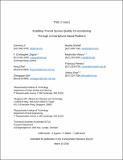Enabling Bus Transit Service Quality Co-Monitoring Through Smartphone-Based Platform
Author(s)
Zhao, Fang; Qin, Zhengquan; Pereira, Francisco; Li, Corinna Lubin; Zegras, Pericles C; Shahid, Ayesha; Ben-Akiva, Moshe E; Zhao, Jinhua; ... Show more Show less
DownloadTRBPaper17-04615 Li et al_FMS-TQ_TRR_new.pdf (337.7Kb)
OPEN_ACCESS_POLICY
Open Access Policy
Creative Commons Attribution-Noncommercial-Share Alike
Terms of use
Metadata
Show full item recordAbstract
The growing ubiquity of smartphones offers public transit agencies an opportunity to transform ways to measure, monitor, and manage service performance. The potential of a new tool is demonstrated for engaging customers in measuring satisfaction and co-monitoring [Editor’s note: This is the authors’ word, meaning “agencies using public feedback to supplement official monitoring and regulation.”] bus service quality. The pilot project adapted a smartphone-based travel survey system, Future Mobility Sensing, to collect real-time customer feedback and objective operational measurements on specific bus trips. The system used a combination of GPS, Wi-Fi, Bluetooth, and accelerometer data to track transit trips while soliciting users’ feedback on trip experience. Though not necessarily intended to replace traditional monitoring channels and processes, these data can complement official performance monitoring through a more real-time, customer-centric perspective. The pilot project operated publicly for 3 months on the Silver Line bus rapid transit in Boston, Massachusetts. Seventy-six participants completed the entrance survey; half of them actively participated and completed more than 500 questionnaires while on board either at the end of a trip, at the end of a day, or both. Participation was biased toward frequent Silver Line users, the majority of whom were white and of higher income. Indicative models of user-reported satisfaction reveal some interesting relationships, but the models can be improved by fusing the app-collected data with actual performance characteristics. Broader and more sustained user engagement remains a critical future challenge.
Date issued
2017Department
Massachusetts Institute of Technology. Department of Civil and Environmental Engineering; Massachusetts Institute of Technology. Department of Urban Studies and PlanningJournal
Transportation Research Record: Journal of the Transportation Research Board
Publisher
Transportation Research Board of the National Academies
Citation
Li, Corinna et al. “Enabling Bus Transit Service Quality Co-Monitoring Through Smartphone-Based Platform.” Transportation Research Record: Journal of the Transportation Research Board 2649 (January 2017): 42–51
Version: Author's final manuscript
ISSN
0361-1981